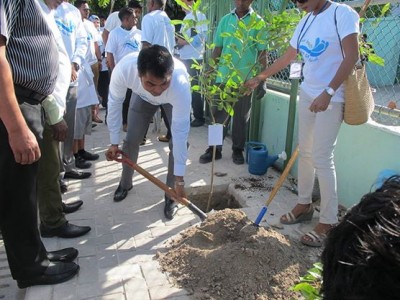Global climate justice NGO 350.org has reaffirmed that “urgent action is needed to address the climate crisis” in the Maldives, and that its continued active international leadership is “immensely important”.
In light of the IPCC’s findings and the danger sea level rise poses for the Maldives, 350.org has highlighted the essential international leadership role former President Mohamed Nasheed and the country have played for achieving climate justice.
“The IPCC’s 5th assessment report largely reaffirms what we already knew, and makes it abundantly clear that urgent action is needed the world-over. It is immensely important the Maldives to continue it’s active, leadership stance to go carbon neutral within a decade and advocate for more international action,” Will Bates, Global Campaigns Director and Co-Founder of 350.org told Minivan News.
The Intergovernmental Panel on Climate Changes’s fifth assessment report emphasised the importance of human influence on the climate change system.
“Warming of the climate system is unequivocal, and since the 1950s, many of the observed changes are unprecedented over decades to millennia. The atmosphere and ocean have warmed, the amounts of snow and ice have diminished, sea level has risen, and the concentrations of greenhouse gases have increased,” read the report released last month.
“As the ocean warms, and glaciers and ice sheets reduce, global mean sea level will continue to rise [during the 21st century], but at a faster rate than we have experienced over the past 40 years,” said IPCC Working Group 1 Co-Chair, Qin Dahe.
The IPCC’s report “sounds the alarm for immediate action on climate change,” declared 350.org.
“The report, which is the most authoritative, comprehensive assessment of scientific knowledge on climate change, finds with near certainty that greenhouse gas emissions are warming the planet and that climate impacts are accelerating… Scientists have upped the certainty that humans are responsible for warming, increasing their confidence to 95%,” highlighted 350.org.
350.org has been building a global grassroots movement to solve the climate crisis. It has coordinated over 20,000 climate demonstrations in more than 182 countries since the organisation’s founding in 2008.
350 parts per million is what many scientists, climate experts, and progressive national governments are now saying is the safe upper limit for carbon dioxide in the Earth’s atmosphere.
“The world needs more political leaders like President Nasheed”: 350.org
Bates noted that former President Nasheed has been an integral figure for the global climate justice movement.
“President Nasheed’s courageous and creative actions to confront the true scale of the climate crisis in 2009 and 2010 were a powerful wake-up call for the world. Hearing from an entire nation about the imminent threat to their future through their democratically elected president, and seeing their actions to address the crisis was an inspiration for the rest of the world to step up our efforts to address the climate crisis,” Bates stated.
“The world needs more political leaders like President Nasheed who understand the severity of the threat, and who speak and act truthfully in response,” he added.
The NGO also believes President Nasheed’s leadership within the Maldives has benefited the nation’s domestic climate justice movement.
“I believe it was in part thanks to the openness and freedom given to civil society in general during his administration that allows young people and NGOs to organize on climate change above and beyond what President Nasheed was working on at the national policy and international levels,” said Bates.
“No doubt his efforts to have the Maldives go carbon neutral in a decade was a powerful act of leadership that more governments around the world should be following as well,” he added.
“We support human rights and a free and fair democratic process in the Maldives,” Bates noted in regard to Nasheed’s ongoing domestic efforts to ensure these values are upheld.
Although he emphasised that 350.org is not directly involved in Nasheed’s political struggles at home, Bates explained how the non-violent direct action strategy 350.org employs can benefit the Maldives in its fight for climate justice as well as democratisation.
“Social movements around the world have proven the power of non-violent direct action as a means of creating change, political and otherwise,” he said.
“President Nasheed’s underwater cabinet meeting in 2009 was a particularly creative form of action, and there are countless ways that different non-violent tactics – from marches and rallies to culture-jamming and online memes – can enhance struggles against climate change as well as for promoting democracy and fair elections,” he continued.
 “We’ve seen incredibly creative actions in the Maldives by grassroots activists fighting climate change too and with such international concern for the political situation there, similar tactics could be employed at the current time with great effect,” he added.
“We’ve seen incredibly creative actions in the Maldives by grassroots activists fighting climate change too and with such international concern for the political situation there, similar tactics could be employed at the current time with great effect,” he added.
Nasheed has often spoken of the close interrelationship between climate change, human rights, and democracy, particularly since his February 7, 2012 controversial transfer of power, and 350.org has echoed this belief.
“Human rights and climate justice are very clearly inextricably linked as the climate crisis infringes on people’s access to food, water, health, and general security. Furthermore, the causes of the climate crisis, such as the extraction and burning of fossil fuels and cutting down forests have immense human rights implications. Meanwhile many the solutions, such as more decentralized renewable energy infrastructure, are in many ways a step towards democratizing more of how our world works,” said Bates.
“Although that is not to say that countries that exist with undemocratic systems of government can’t also enact solutions to achieve greater human rights and climate justice,” he added.
Extreme sea level rise threats
“The rate of sea level rise will very likely exceed that observed during 1971–2010 due to increased ocean warming and increased loss of mass from glaciers and ice sheets,” all prospective scenarios in the IPCC’s report projected.
Sea level is expected to rise between 0.26 metres (0.85 feet) and 0.98 metres (3.22 feet) by 2100, depending on the amount of greenhouse gas emissions produced this century, it added.
While these projections represent the possible low and high extreme scenarios of sea level rise, small island states – such as the Maldives – are especially vulnerable, the IPCC previously stressed in it’s fourth assessment report.
With over 80 percent of the land area in the Maldives being less than a meter (3.28 feet) above mean sea level, “the slightest rise in sea level will prove extremely threatening,” UNDP Maldives previously declared. “A rise in sea levels by 0.50 meters could see significant portions of the islands being washed away by erosion or being inundated [by the ocean].”
“Even now some islands are seriously affected by loss not only of shoreline but also of houses, schools and other infrastructure,” it continued.
Not only is the Maldives extremely vulnerable to sea level rise, other climate change impacts – including extreme weather events, coral bleaching and acidification – which exacerbate these negative effects, it added.
Earlier this year the World Bank also expressed the urgent need for concerted efforts to support the Maldives in adapting to climate change due to sea level rise projections.
Additionally, the UN’s 2013 global human development report highlighted inequality and climate change vulnerabilities as major concerns for the Maldives, despite the country’s “significant economic growth” in recent years.
Likes (1)Dislikes
(1)Dislikes (1)
(1) 
 “We’ve seen incredibly creative actions in the Maldives by grassroots activists fighting climate change too and with such international concern for the political situation there, similar tactics could be employed at the current time with great effect,” he added.
“We’ve seen incredibly creative actions in the Maldives by grassroots activists fighting climate change too and with such international concern for the political situation there, similar tactics could be employed at the current time with great effect,” he added. In addition to sea level rise, the compounded impacts of increased temperatures and extremes of heat, increased intensity of extreme weather events (including flooding and tropical cyclones), and changes in the monsoon pattern are already occurring and are anticipated to worsen, according to the study.
In addition to sea level rise, the compounded impacts of increased temperatures and extremes of heat, increased intensity of extreme weather events (including flooding and tropical cyclones), and changes in the monsoon pattern are already occurring and are anticipated to worsen, according to the study.